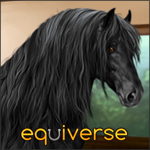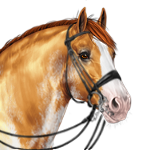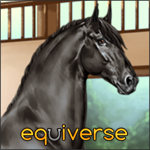|
#268039 Posted on 2023-04-10 23:46:13
GVs seem to have been bred by both Irish Travellers and English Romanichal Travellers, which are different cultural groups. Changing the name on EV is a tricky decision when lots of the organisations centred around GVs haven't updated their names. I don't really mind if the name is changed to Irish Cob or remains the same.
In the past I have researched "Gypsy" (Roma) music and it doesn't seem like there is a clear consensus in the Roma community about whether or not the usage of "Gypsy" is always offensive. The Oxford Dictionary itself marks "Gypsy" as "sometimes offensive". Many Roma people use "Gypsy" self-referentially and identify strongly with it. Others view it as a slur regardless of context.
The Chronical of the Horse article titled "Is It Time For The Gypsy Vanner Horse To Find A New Moniker?" has some interesting stuff. Few different opinions in there from different Roma and non-Roma people.
_________________________
“I come from a background of traditional Romany Gypsies—and my dad actually finds the word Traveler really offensive, because the groups are totally different. It’s been watered down because people find the word ‘Gypsy’ offensive, and to be honest, it’s usually non-Gypsy people taking the offense,” says British five-star event rider Phoebe Buckley.
Though Buckley’s career in the horse industry sees her ride an entirely different stamp of horse, she views the success of the distinctive feathered cobs as a particular point of pride.
_______________________________
The beginning of the cobs’ American story came in 1996, a year after they ostensibly were “discovered” by Dennis Thompson and his late wife, Cindy, of Ocala, Florida, during a trip to the U.K.
So enamored were they with a piebald stallion they’d spotted in a field—which they learned was owned by a Traveler named Fred Walker—that they brokered a deal to buy the horse the following year. In 1996, the Thompsons established the Gypsy Vanner Horse Society using the stallion, renamed Cushti Bok, as their foundation sire.
Thompson said they grappled with what to call the little piebald horses they had imported.
“The aim, from day one, was to bring dignity to the people who started the breed,” he says. The inspiration for the name came when Cindy found a small caption in a copy of “The Coloured Horse and Pony,” by Edward Hart. Under a picture of exactly the type of horse they’d stumbled upon, the text read, “the traditional Gypsy Vanner horse.”
“I said ‘neat name’, and then awoke up every night for the next two years thinking about it,” Dennis recalls. “I thought, ‘Am I really bringing honor by using a word that can be used as a slur?’ ”
The Thompsons consulted the friends they’d met in the Romany and Traveler communities, from whom Dennis says the consensus led firmly in the direction of naming the breed the Gypsy Vanner, rather than the Romany horse, which would negate the input and influence of Traveler cultures beyond the Roma people.
“It was the only word that honored everyone,” he says.
______________________________________________________
Harry Pannell, of Sussex, England, part of the youngest generation of a long line of Romany horsemen and women, feels differently.
“It probably isn’t really recognized as culturally offensive in this day and age, as it has become a phrase of pride and racial empowerment,” he explains. But, he points out, its origins as an ethnic misnomer muddy the waters. “If somebody today incorrectly labelled an ethnic group of people by a country’s name due only to their skin color, it would be thought of—quite rightly—as abhorrently ignorant. But now, there are a lot of people of similar descent to my own who are probably not aware of what happened in the Middle Ages.
“Of course they should be proud of their heritage, but the fact is, the term ‘Gypsy’ was, and still is, a phrase given as a name to the Romany people by ignorant medieval British people that didn’t know where the sun went at night, let alone about where ethnicities originated.”
His own family, he says, chooses not to use the term Gypsy self-referentially, instead choosing to call themselves Travelers—and even then, only in conversation with others of the same heritage.
Last edited on 2023-04-10 at 23:47:05 by Ж wox
5 members like this post.
|
Posted By

Ж wox
#66767

Member is Offline
279 forum posts
Send A Message
|
|
#268635 Posted on 2023-04-26 11:55:02
I agree with and appreciate Wox's reply. Opinions from people--specifically Romani people--both for and against the usage of the word deserve to be heard and seriously considered. Since the word is tied to them--their history and identity--so strongly, their input is of utmost importance and of course most relevant, regardless of what we think or feel about the word.
Personally, I don't really mind either way if the name changes or stays the same. I don't breed Gypsy Vanners and I don't plan to, so I don't have a horse in this race, so to speak lol.
It's a bit of a tricky thing though, considering the word is not actually a slur. Offensive, particularly in certain contexts? Absolutely. But a slur? No. there is a difference between offensive words/terms and actual slurs, and therein lies the problem. Because when it comes to offensive words, opinions are always going to be split, and the issue of the double-edged sword called censorship inevitably becomes involved as well.
If the breed name is changed based on the idea that the word "Gypsy" is offensive, how far should you go? Should the word itself be banned altogether, issuing warnings to players who use it on the forum, their profiles or stables, or in horse names (which has been done on some other games)? If it's bad enough to be changed in game even though it's still the official breed name IRL (in some countries), then surely it's a word that shouldn't be used at all. Except, for some Romani people, it's how they identify and what they prefer to be called, or even further, it is a badge of pride for them. If Romani people who felt like that were playing here on EV, would it be fair to tell them they aren't allowed to use that word, because people who are offended by it (whether they are Romani themselves or not) take priority over them?
Evidently, there are some Romani people who take pride in having a breed named after them. In which case, how fair is it really to try and erase that name? And for those who are offended by the word being used to refer to them personally, how do they feel about it when it is not used to refer to people at all, rather to a breed of animal? There seems to be mixed feelings about it, from what I've seen looking into it, myself. Some may, despite being offended by it in reference to people, not actually care about it being part of a breed name for an animal. Some may find the word offensive regardless of context. And again, some don't find the word offensive at all so long as it's not used derogatorily.
I think it's not such a cut and dried situation as some might feel.
Fundamentally, I think it should be up to Romani people, not us, to decide whether or not the word should be used, both in general and in the name of a horse breed. It tends to be very unproductive for people not part of the group in question (despite good intentions) to determine whether or not something is offensive to that group. Oftentimes, the result is that people who don't and can't have a full understanding of the group's history, culture, or opinions jump the gun and enforce rules or mentalities that are unnecessary at best and problematic/outright offensive at worst. I have both witnessed this happen, and been part of a group on the receiving end of those well intended but poorly executed attempts to make things "right."
But it doesn't seem like there are any Romani people on EV that are active/interested in participating in this thread so far, and even outside of the EV sphere, Romani people are not in agreement about the use of the word. Some don't care either way, some are offended, and some are proud of it and use it.
Personally, I don't think that at this time a change of breed name here for GVs is necessary, particularly because it is not being used derogatorily, is still one of the official breed names, and is arguably the most known name to boot. But as I mentioned to start with, while I don't think it's necessary, I wouldn't be upset whether it changed or remained the same. I think it's an interesting discussion to have though. I do--and will continue to--call the breed Gypsy Vanners both IRL and online considering it is the official breed name where I'm from and I do not find the popular substitution (or really any I've heard) to be an adequate one. Of course, this is so long as it remains an official breed name IRL. If that ever changes (and I would hope the change is initiated by Romani people if that happens), I will be happy to use the new officially recognized name. Until then, I don't see a reason to use any other.
Last edited on 2023-04-26 at 11:57:07 by Aeromase
1 members like this post.
|
Posted By

Aeromase
#126262
Member is Offline
11 forum posts
Send A Message
|
|
#268639 Posted on 2023-04-26 13:51:04
I initially supported this suggestion. However, I decided to change my vote to no support for now after seeing Wox's post.
I am not Romani, so I don't have a right to decide if the word "gypsy" is offensive. I initially supported it because I was under the impression that Romani considered the word to be offensive. However, Wox's post makes me realize that it may be not the case. I think we should do more research before changing the name as Gypsy Vanner may be a name that holds value.
Wox's post reminded me of a similar situation with the ASL sign for Native Americans.
In ASL, we had a sign word for Native American for many years. The sign itself is inspired by the feather headdress which is worn by specific tribes. In the 2000s, there was a movement by activists to change the original sign to this sign which is inspired by their facial paints. The supporters of the movement claimed the feather sign was offensive and that we should change it to the facial paint sign. However, some people argued that some tribes also do not use facial paints as their traditions. That led to two new signs: "Indigenous" and Back of Hand.
By the 2010s, we have 4 different signs for "Native American". It confused a lot of people because there was no general consensus on whether the first two signs were offensive or not. The indigenous sign is for the word "indigenous" so some people get confused when we use that sign because they aren't sure if we are referring to Native American or Indigenous. The word "Indigenous" can refer to non-Native Americans so it makes more sense if we have a separate sign for Native American. As for Back of Hand, some people also think it's offensive because it may or may not refer to skin color tone.
I met a Deaf Native American when I went to college. At that time, Back of Hand is considered the most acceptable and non-offensive sign. In the class discussion related to Native Americans, we used that sign and that girl interrupted the discussion to ask "What does that sign word mean?" and she was referring to the Back of Hand sign.
We were so shocked because she doesn't even know what that word means despite being a Native American herself. We explained to her that the sign represents Native American and she asked us why we used it, not the feather one. We explained that there was controversy behind the sign and she thought it was dumb. Her entire tribe used the feather sign and her tribe do not use a feather headdress. None of them found it offensive.
Around a year or two later, I started to see many deaf Native American making posts about the sign word for Native American.
General Summary of this:
My thoughts at this point (Nov. 2020) would be for those of you learning (using or teaching) ASL to make sure you know the "F"-hand two-contact (lower cheek [and/or the nose] to upper cheek / side of head / or side of forehead) (feather / headdress) version of the sign. It is a solid choice when signing "Native American" for several reasons:
1. A significant number of Deaf Native Americans (arguably "the majority") know, use, and like the "F"-hand version of the sign.
2. That sign has been around for a very long time.
3. That sign has (arguably) 100% (or nearly so) recognition among Deaf Adult native ASL signers.
4. That sign is listed in every (as far as I can tell) major ASL dictionary that has an entry for the sign.
HOWEVER:
1. Interpreters and others should certainly be able to recognize the other variations of the sign for "Native American."
2. "Deaf Native United" has only posted "one" clip (as of this time), only has 28 subscribers (as of the moment of this comment) and the clip has only been viewed a few thousand times (as opposed to tens of thousands of times).
3. ASL under constant pressure from "activists." Such individuals (or groups) push for changes that they feel are "improvements."
4. With technology these days it is fairly easy to "cherry pick" the internet and find a couple dozen versions of any particular variation of a sign and cobble together an impressive-looking video and post it under any impressive-seeming "group name" you would like. Thus even though a couple dozen Deaf Native Americans appear in a video uploaded by some (anonymous) person with a preference for a specific sign version -- still doesn't mean that particular sign will remain dominant for any length of time. It also doesn't mean that there are not other versions out there that may be becoming more and more popular over time.
- Lifeprint
The general consensus among Deaf Native Americans (my former classmate is one of the people in the video)
I bolded the #3 because there are so many different controversies about various sign words. The deaf community had a huge debate over sign words for "Family", "Culture", and more. For those who understand ASL as there's no subtitle or transcript.
The biggest take I learned from the entire Native American sign controversy is to not make assumptions about whether a word is offensive or not. The activists managed to confuse the entire deaf community in North America because they assumed that they were offensive and decided to change the sign for Native American, Family, Culture, and more. They will go and tell people to not use this sign because it's offensive and to use a new sign that they invented. In doing so, the deaf community almost erased the original sign word. We nearly erased Deaf Native Americans' identity because a group of people decided that the original sign need to be changed.
It's the same for Gypsy. If Romani rather be called gypsy instead of traveler, then we need to respect it instead of trying to erase the word, Gypsy.
EDIT: Another thing I thought of is the importance of context. For example, "Black" can be considered offensive or not depending on the context. A simple statement of "I am Black" is not offensive as it's just a statement of a person's race identity. However, if a person said "Oh, he's Black" with a tone of distaste. The term "Black" suddenly became an offensive and slur-like term. Since Black is sometimes used in negative contexts, the term "African-American" was pushed to replace the term Black. However, most of the Black people I met consider themselves as Black, not African-American. It's their identity and they don't want to change it. Some of them legit will get upset when someone called them African-American and considered it offensive. There are several people who identified themselves as African-American and considered Black as offensive. However, that doesn't mean Black is the wrong term to use. So do African-Americans. The best thing we can do is ask them how they identify themselves and respect their preferred term. It's the same for all other races and ethics. Even the term "White" can be spoken as a slur depending on the context. "White Men" is a common example. People associated the term "White Men" as a negative instead of positive or neutral. Another example is "Chinese" as it can be used as a slur in some contexts. We see that when COVID first appeared and still see it today. People will curse at Asians and call them Chinese.
Another example related to the Deaf Community is the term Hearing-Impaired. Most Deaf people considered Hearing-Impaired as an offensive term. However, there are people who have hearing loss and do not identify themselves as Deaf but as Hearing-Impaired. The medical field like to use hearing-impaired instead of Deaf as well. Now, is it truly wrong to use hearing-impaired? Not really. It's only wrong if you use the term to refer to people who identify as Deaf. If you are referring to people with hearing loss, then it's not wrong. I've seen a lot of deaf people pushed to erase Hearing-Impaired but it only creates more problems. Again, respect everyone's preferences.
Now, N-word is a completely different story. N-word is considered a slur in any context. People typically don't identify themselves with N-word. N-word is strongly encouraged to be censored. Yes, there are a few people who try to use N-word in a positive way but it's not widely accepted even in the Black community (especially the older people).
We are being informed that Gypsy is on the same level as N-word when it may be on the same level as Black/Chinese/Etc. It's possible that we are being misinformed about Gypsy being purely a slur and needing to be censored when some Gypsies still consider themselves as Gypsy and identified as Gypsy. We should respect their identity preferences even if others think it's offensive. It's more offensive (and racist) if we are trying to erase one's identity.
Just because some terms can be used in a negative way does not mean we must censor and replace them. We do not need to censor and replace Chinese and it's the same for other terms. The world just needs to learn how to read the context and decide if it's intended to be offensive or not at that moment. Gypsy Vanner, for example, is not intended to be offensive and is intended to honor its history.
Last edited on 2023-04-27 at 11:06:37 by Lucia
4 members like this post.
|
Posted By

Lucia
#132336

Member is Offline
440 forum posts
Send A Message
|




